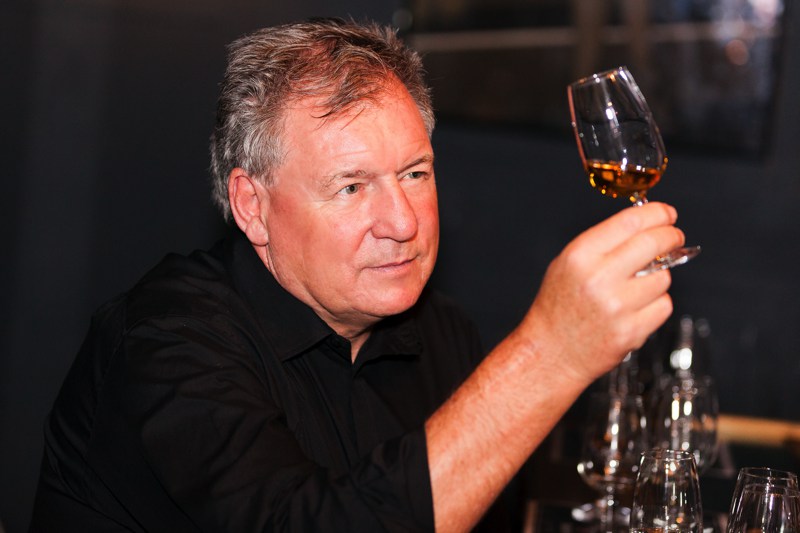Full name: Andy Watts
Role: Distell: Head of Whisky Excellence
DOB: 04.10.60
Birthplace: Chapeltown, UK
Twitter Handle: @TheWhiskyMaker
Website: www.bainscapemountainwhisky.co.za
Fun fact: “…as a cricketer, I batted left handed but bowled right handed”
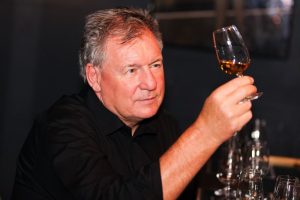
Born in not so sunny Yorkshire, some time as a professional cricketer (for Derbyshire?) – you ended up in South Africa coaching cricket, met some Morrison Bowmore people at a party and now you’re making whisky in the middle of the wine country. Oh, and Master Distiller / Master Blender of the year in Whisky Magazine’s ‘Icons of Whisky’ Awards last year, very nice! Could you tell us about your earlier years? Did you come from a food and drink background? Was alcohol distillation always on the cards for you?
I grew up in Penistone, a small market town in what was then the West Riding of Yorkshire and now South Yorkshire. I had a very happy childhood with two amazing hard working parents and one younger brother. Spare time, days and nights, were spent outdoors, down at the local rec, playing either cricket or football dependent on the season. I attended Springvale Junior School and Penistone Grammar School where I stayed on at the latter to complete my A levels. But to be honest school was an excuse for me to play sport and try to fulfil the dream which most kids had in those days and that was to be a professional sportsman.
I attended Springvale Junior School and Penistone Grammar School where I stayed on at the latter to complete my A levels. But to be honest school was an excuse for me to play sport and try to fulfil the dream which most kids had in those days and that was to be a professional sportsman.
Financial restrictions meant that I didn’t go to University, through my choice, as my parents would have given anything for me and my brother. I worked for a short period in a local building society before getting the opportunity to trial with Derbyshire County Cricket Club where I then received a professional contract.
I think you can gather from that, that a career in the alcohol industry didn’t even feature on my radar.
I got the opportunity to escape the cold English winter and play cricket in South Africa in 1982 and after two seasons of back and forth Derbyshire then released me from my contract and I decided to make South Africa my home in October 1984.
Throughout those early days in South Africa, as though almost by destiny, I had many moments of being in the right place at the right time on more than one occasion. As part of my cricketing contract, I was obliged to do part time work for a sponsor, Stellenbosch Farmers Winery (SFW), the company which later merged to become what is known today as Distell.
I was appointed full time by SFW as the Spirits Blending Manager in 1984. It was during the mid to late 80’s that I was fortunate to be invited to Scotland on a technical exchange programme with a company called Morrison Bowmore Distillers. I spent time working at their Glen Garioch and Auchentoshan distilleries, as well as time on the Isle of Islay at their legendary Bowmore distillery.
It was whilst in Scotland that I got to meet and work with some of the most influential whisky leaders at that time – people with an incredible passion for whisky. Their enthusiasm and love for making and enjoying whisky I brought back with me to South Africa to head up the whisky operations at the James Sedgwick Distillery in Wellington.
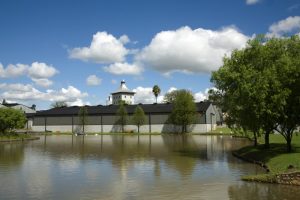
As far as whisky producing regions go, South Africa is probably one of the least known, despite, I suppose, the fact that the Sedgwick Distillery has been there for well over a century. Could you tell us a little more about the whisky you make? Does the region have a terroir, or something that typifies the style?
The James Sedgwick Distillery is quite unique. Apart from being the only commercial whisky distillery on the continent of Africa it is also one of the few with the capability to produce both malt and grain whiskies on the same premises.
Although the distillery was founded in 1886 it was predominantly a brandy distillery until it became the home of South African whiskies in 1990.
We are situated in the winelands region of the Western Cape in a town called Wellington, about an hour’s drive from Cape Town. We have traditionally hot, dry summers and cool moderately wet winters. This leads to a higher than usual ‘Angels Share’ the portion lost to evaporation during the maturation process of our whiskies.
We can lose up to 5% of the alcohol per year compared to some of our colder Northern hemisphere colleagues who lose between 1 and 2% per year. This however, we believe, helps accelerate the aging process so although the legislation states a minimum period of gaining in wooden casks of three years our whiskies tend to portray themselves as older and smoother at a younger age.
Another challenge our climate puts forward is the fermentation temperatures! The yeast needs an ideal temperature so that it can do its work under optimum conditions. To ensure the yeast does not take any strain we now control the temperature of our fermentation to ensure consistent results.
I was taught at a very early age in my whisky career that you can’t distill a good spirit from a bad fermentation. Something which I have tried to instill in our teams over the years and which is one of the key reasons for the dramatic improvement in the quality of our whiskies in a relatively short period of time.
Of all the whiskies you have produced (or had a hand in making), which are you proudest of?
That really is like asking me which one of my amazing twin children I like the best. Three Ships has brought many firsts to the local and international whisky scene of which I am extremely proud. The fact that the company allows me to be innovative means the excitement of future whiskies will always remain. However, if you had to put me on the spot I think it would have to be Bain’s Cape Mountain Whisky.
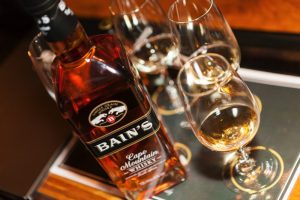
From envisioning the idea of a single grain in 1999 to its inception into the market in 2009….the incredible success and acceptance for a 100% South African single grain whisky, a category which at that time was not really whisky ‘fashion’ and now to see the brand available on the global platform gives me amazing satisfaction.
I’m aware you are still quite active – cycling the foothills of the Limietberg Mountain range, plus something you once described as ‘old man’s social cricket’? What else might we find you doing in your spare time? Asides from whisky, do you drink anything else?
I love to cycle but most other things have taken a back seat as the balance in my life is a little out of sync at the moment. My passion for what I do allows it to consume me at times and that means I love the interaction with consumers and the opportunity to change misconceived perceptions of South African whisky. Therefore travel is increasing with marketing activities but I still do have my ‘day’ job!
Living in the heart of the Winelands I have come to love and enjoy wine. Within our own company and the independent wine estates in our area it is not difficult to love wine. There is a saying that ‘A day without wine is like a day without sunshine.’ Our South African climate lends itself to that quotation.
What’s a ‘day in your life’ like? Could you give us an insight into the whisky business?
After spending 25 years as manager of the James Sedgwick Distillery, I was appointed 18 months ago as Distell’s Head of Whisky Excellence. This means I take lead responsibility for the company’s entire whisky portfolio focusing on the process, quality and style of our whiskies. I however, continue to provide strategic guidance to the production of the range of Three Ships Whiskies and Bain’s Cape Mountain whisky, made at the James Sedgwick Distillery.
With regards to our Scottish whisky portfolio of Bunnahabhain, Deanston, Tobermory, Ledaig, Black Bottle and Scottish Leader we have an amazing blending team in Scotland led by Dr. Kirstie McCallum so my involvement is purely in an advisory capacity.
Regular days involves meetings with the current distillery manager, Jeff Green, working on innovation and setting whiskies in interesting casks and finishes to create limited editions over the next few years. Troubleshooting is also an important part of my day as any issues which we may be finding in our processes need to be addressed.
Time is also spent on projects aimed at improving best practices at our distilleries and bottling facilities. Marketing discussions, whisky shows and educational events also take up a large portion of my time as this normally involves extensive travelling.
What’s your greatest/most memorable professional moment been, so far?
In 2015, I was named ‘Wellingtonian of the Year’ and ‘Wellington Businessman of the Year’. This was the first time in the town’s history that these two awards went to the same person in the same year.
These awards were extra special for me as it was people from outside our business who were recognising a person’s contribution to the town.
On the whisky front it has to being named the 2016 Rest of the World ‘Master Distiller/Master Blender’ at the Whisky magazine’s Icons of Whisky annual awards.
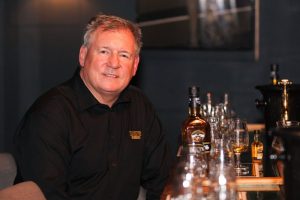
Where do you get your ideas?
A lot of my ideas come from looking at world whisky trends as well as trying to anticipate what the next whisky trends might be. Emotion also plays a big role in my ideas for example being on the magical Island of Islay in the late 1980s was the inspiration behind the creation of Three Ships 5 Year Old Premium Select.
What’s your philosophy, summed up in a sentence?
“Whether you do or whether you don’t, either way, you will be right”. #justdoit
What’s the biggest challenge you’ve had, how did you overcome it, and what did you learn from it?
Over the years I have been involved in many projects at the distillery which have been managed by both our own engineers and outside engineers. The hand-over of most projects has never been straightforward and rarely ‘plug and play’. The installation of new plate technology into our distillation process was probably the one that created the biggest challenge.
We were left with a process which could not run for more than 24 hours at the end of the project and the engineering company insisted everything was right from their side.
I had little distillation experience at that time and my chief distiller with years of experience but no formal education was all I had to fall back on. I believed and trusted my chief distiller and we worked tirelessly to identify the fault from which the engineers and their computer programs had walked away from. Eventually, we did and we showed that the plates had been incorrectly fitted. The engineers were brought back and they had to agree. When the plates were refitted the process worked as per design.
The lesson out of this for me was to know how to ask the right questions and trust your teams around you, especially when they have greater practical experience, than you personally have. Since that day, early in the distillery manager career, I always tried to make appointments of people who were as strong as or stronger than me.
Who’s the person who’s most inspired you in your work – food industry or otherwise? Is there anyone that you draw inspiration or strength from? Do you have any specific culinary influences?
There are too many to mention but David Gressick, the Chief Chemist and later Production Director at Morrison Bowmore Distillers was influential in my early career. My first manager who appointed me at the James Sedgwick Distillery, Jan le Roux was another. He taught me that with any production issue ‘If he didn’t know the answer and I didn’t know the answer then the company could not afford two people who did not know the answer’
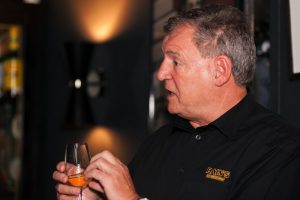
Currently, I draw incredible strength from my son-in-law and my daughter and how determined they are in achieving their business goals.
With regards to culinary influences I will always give my whiskies to a chef to construct a menu if it is a food and whisky evening. I do not have any culinary skills and I am a very basic eater.
What do you enjoy most and least about what you do?
The creation of new whiskies is most satisfying. That sense of anticipation as you draw closer to the launch date and the accompanying uncertainty as to how the whisky will be received is an adrenalin rush difficult to describe. Working with marketing and the opportunity to travel and spread the proudly South African whisky word whilst trying to change the perceptions of consumers through interaction and tastings is also greatly fulfilling.
What I least like about my work is administration and sitting in an office. I feel that can be done by anyone and that my skills and time are then not utilised optimally.
What advice would you give to aspiring drink professionals who’d what the kind of results that you’ve had?
I have been extremely fortunate in my career. I was given almost carte blanche in the early years to experiment and develop processes. I made mistakes but they were allowed and we learned from them and moved on. The whole industry is now different with much less room for my #just do it attitude. Saying that I think my son-in-law sums it up very well in what he calls the 3 D’s – discipline, dedication and determination.
If you have these attributes and are prepared to learn from those around you then it will help you go along way. Also, be prepared for not moving up the corporate ladder every two years. There is no way that you learn what it takes to become a success in the whisky production industry and be able to move on in a short period of time.
If you weren’t doing what you do now, what would you be doing instead?
I believe I would have still been involved in the sports industry in some form or another. Be it as a coach or someone who loads the equipment onto the team bus – if I am around sport I am happy.
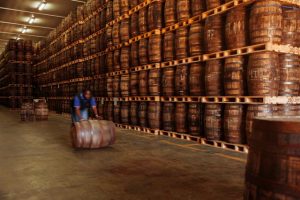
If you could get anyone to try your whiskies (fictional or real, living or dead) who would you pick and which of the whiskies would you like them to try? Assume that they go on to be your brand ambassador…
Here I would kill two birds with the proverbial one stone! It would without doubt be Chef Sue-Ann Allen, a culinary chef in her own right, an amazing lady and one who already loves the whisky I would choose namely Bain’s Cape Mountain Whisky.
What’s your ultimate aim and goal for the whisky / your career? If you could achieve anything with it, what would you pick? Money and reality are no obstacle, so shoot for the moon…
I will never forget when working in Scotland in the mid to late ‘80s that every bar had a certain whisky in it. My dream is to have Bain’s Cape Mountain Whisky feature in every bar from New York to Beijing and be the whisky everyone is asking for. As my incredible PR lady Linda always tells me ‘Our aim is to take people from being curious about our whiskies to being serious about them.’
Where next for you and your business?
I am working on two really exciting projects at the moment with a couple more to come in the next 12 months. We have a number of whiskies currently in production and the long-term business plan is in place with my firm commitment to ensure that the pipeline of new releases remains full. However, I also realise that I am in the twilight of my career even though I believe our whiskies are only in the dawn of theirs. I need to find that balance again!
Anything I missed that you’d like to include here?
When it comes to whisky I personally do not believe that there is one whisky which suits every occasion and that if you are only drinking one whisky then you are doing yourself a disservice. The whisky journey, taken responsibly, is an amazing voyage of discovery and one which may lead to whiskies which you may never have heard of or considered trying. It is also a journey which has no final destination making so much more of an adventure.
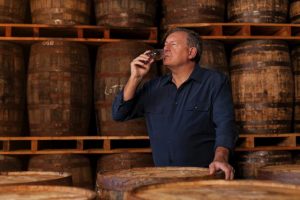
And we always ask three customary ridiculous questions…
If you were given an infinite budget but had to spend it all on entirely frivolous stuff, what are the three things you’d buy and why?
A dinner out with actress Sally Thomsett…as a 10-year-old youngster I think I watched the movie ‘The Railway Children’ a hundred times in our local cinema just to see her. I am sure we have both changed beyond recognition but just to buy back those memories … if just for one night!
A perfectly manicured golf course just for my use.. then I could try to improve my game at my pace and without having to shout ‘fore’after most shots.
A season on board one of the ‘Wicked Tuna’ boats but with my own crew… I love the sea and fishing and to do that with the competitive edge too …heaven!
If you had to have any character from Egyptian mythology come and work with you, who would you employ?
It would be Horus, the Egyptian God of the Sky. After losing his eye in a fight the ‘eye’ in the form of ornament or small piece of jewellery was thought to fight off evil, danger and disease.
I believe that far too much of our brain’s capacity, at the moment, is taken up by things which concern us. If your workforce knew that evil, danger and disease were no longer a concern then just imagine the power of a workforce with complete brains!
If you had to be transformed into any kind of household appliance, but retained your memories, ability to speak and personality, what would you pick?
The fridge… I would love to know what happens to all the food as there is never anything in the fridge when I am home.
